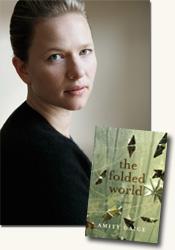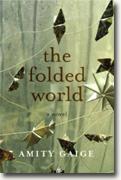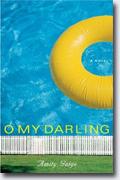author interview
book reviews:
· general fiction
· chick lit/romance
· sci-fi/fantasy
· graphic novels
· nonfiction
· audio books
· author interviews
· children's books @
curledupkids.com
· DVD reviews @
curledupdvd.com
newsletter
win books
buy online
links
home
for authors
& publishiss
for reviewers

|
|||||
 
Amity Gaige talks with Michael Leonard about The Folded World Interviewer Michael Leonard: The Folded World Amity Gaige: The novel had many influences. The story itself came from a newspaper clipping. One unremarkable day, I read an article in my local newspaper about a young, beloved social worker who was killed by a client. The novel just took off from there. A large chunk of the story involves those who are afflicted with mental illness. How did you research the topic? I found the best research was spending time with people, both the mentally ill and the people who serve them. I drove around, talked to anybody, called anybody, and walked into psychiatric hospitals, treatment centers. I read books and case studies. I listened to tapes of what auditory hallucinations might sound like. But mostly the inspiration was the people who were generous enough to talk to me. They could tell me one thing about their lives – a small, unextraordinary detail, and a whole imagined life would grow out of that for me. They were generous to share their experiences, but I didn’t use those exact experiences.
I don’t rightly know. Alice comes from a broken home, where she spent her youth reading alone up in the attic while her mother “listened to feminist musicals downstairs.” Charlie is a do-gooder, a “pleasant surprise,” a golden boy. Their childhoods were so different, yet they both felt lonely, unfinished. They dreamed of each other – or, that angel/person who would heal the loneliness for good. I think that’s what many of us are looking for. Charlie is a man with ambition, totally focused on his career, yet he also readily admits that he cannot help but love Alice. Indeed, Alice makes him want to be like the moon "awake all night watching." What then do you think lies at the heart of this conflict that Charlie has between the rules of work on one hand and the rules of his married world on the other? I think Charlie wants to please everybody. He’s so used to life going nicely, that he just can’t quite understand it when it doesn’t. He doesn’t really know how complex life is. Charlie seems to be really in tune to the suffering of his patients at Maynard Psychiatric, and the powers that be at the hospital certainly give him a lot of responsibility. But why do you think he is specifically drawn to Hal and Opal? Charlie is drawn to Hal because he looks like his own younger brother. He is drawn to Opal, I think, because of her total vulnerability, and also because she likes him. They have a special connection, and he is flattered because she doesn’t connect with anybody but him.
I loved writing the character of Marlene. She gets the last scene in the book before the epilogue, and I found that the resolution of her problem (her estrangement from her own father) was one of the most revelatory for me. She’s a ballbuster, and she’s not very warm or nice, but she turns out to be one of the most moral characters in the book. Early on, the life experiences of Opal and Hal are inserted into story, almost like a mini-narrative, a sort of detour from the main plot. Why did you decide to tell their stories this way? I like this question. This is my explanation: any section that is in italics is a story that was actually being “told aloud” by Charlie to Alice. We know Charlie isn’t supposed to tell Alice all these forbidden, confidential details about his clients, but he can’t help it, so he begins to make the people into stories, or art. (Once Hal and Opal start speaking for themselves, the writing is not italicized.) So there are successive layers of storytelling. To the reader, Charlie and Alice are also a story. When we tell and listen to stories about people, they become both less real (because they are created by language), and more real, because of their greater impact on us. How did you manage to balance the small periods of joy in the story, as seen in the sexual blossom of Alice and Charlie's love affair with the terrible weight of Alice's stress at young motherhood and the pressures of Charlie's work commitments? Thematically, this book is similar to my first, O My Darling The Folded World Thank you very much. I began my writing life as a poet, and then later I wrote plays. I try to read widely, and to build the narrative out of the lyrical facts of the world. Another way of putting it is that everything in a book comes from the language – the characters, the plot, are all made of language. So I try to take care with every word. And finally, what would you like readers to take away from The Folded World Oh, well, it’s a love story – about love for spouses, children, parents, and strangers. I suppose I’d like people to see or feel the love in it. Amity Gaige is the author of the acclaimed novel O My Darling, chosen by the National Book Foundation for its "5 Under 35" program to recognize the achievements of five first-time fiction writers each year. She teaches creative writing at Mount Holyoke College and lives in Amherst, Massachusetts. Contributing reviewer Michael Leonard interviewed Amity Gaige, author of The Folded World (see accompanying review), about her book for curledup.com. Michael Leonard/2007.
|
|||||
| fiction · sf/f · comic books · nonfiction · audio newsletter · free book contest · buy books online review index · links · · authors & publishiss reviewers |
|
| site by ELBO Computing Resources, Inc. | |


